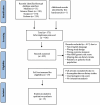The Interaction Between Body Mass Index Genetic Risk Score and Dietary Intake on Weight Status: A Systematic Review
- PMID: 38435632
- PMCID: PMC10908334
- DOI: 10.2147/DMSO.S452660
The Interaction Between Body Mass Index Genetic Risk Score and Dietary Intake on Weight Status: A Systematic Review
Abstract
Background: The escalating global obesity epidemic and the emergence of personalized medicine strategies point to the pressing need to investigate the interplay between genetic risk scores (GRSs), dietary intake, and their combined impact on weight status. This systematic review synthesizes evidence from diverse studies to elucidate how dietary patterns and individual foods interact with genetic predisposition to obesity.
Methods: Literature searches were conducted in the PubMed, Embase, Science Direct, and Scopus databases until August 2023, following PRISMA guidelines. Out of 575 articles, 15 articles examining the interaction between genetic risk score for body mass index and dietary intake on weight outcomes met the inclusion criteria. All included studies were cross-sectional in design and were assessed for quality using the Newcastle‒Ottawa Scale.
Results: Unhealthy dietary intake exacerbated the genetic predisposition to obesity, evident in studies assessing Western diet, sulfur microbial diet, and individual macronutrients, including saturated fatty acids, sugar-sweetened beverages and fried foods. Conversely, adhering to healthier dietary intake mitigated the genetic predisposition to obesity, as observed in studies involving Alternative Healthy Eating Index, Alternative Mediterranean Diet, Dietary Approach to Stop Hypertension scores, healthy plant-based diets, and specific foods such as fruits, vegetables, and n-3 polyunsaturated fatty acids.
Conclusion: This is the first systematic review to explore the interaction between genetics and dietary intake in shaping obesity outcomes. The findings have implications for tailored interventions; however, more controlled clinical trials with robust designs are needed to be able to recommend personalized nutrition based on nutrition for obesity prevention and management.
Keywords: Body Mass Index; Dietary Intake; Genetic Risk Score; Systematic Review; Weight Status.
© 2024 Sokary et al.
Conflict of interest statement
All authors declare no conflicts of interest in this work.
Figures
Similar articles
-
Dietary determinants of healthy/unhealthy metabolic phenotype in individuals with normal weight or overweight/obesity: a systematic review.Crit Rev Food Sci Nutr. 2023;63(22):5856-5873. doi: 10.1080/10408398.2021.2025036. Epub 2022 Jan 10. Crit Rev Food Sci Nutr. 2023. PMID: 35001754
-
Adherence to a healthy plant diet may reduce inflammatory factors in obese and overweight women-a cross-sectional study.Diabetes Metab Syndr. 2019 Jul-Aug;13(4):2795-2802. doi: 10.1016/j.dsx.2019.07.019. Epub 2019 Jul 26. Diabetes Metab Syndr. 2019. PMID: 31405709
-
The effect of weight management interventions that include a diet component on weight-related outcomes in pregnant and postpartum women: a systematic review protocol.JBI Database System Rev Implement Rep. 2015 Jan;13(1):88-98. doi: 10.11124/jbisrir-2015-1812. JBI Database System Rev Implement Rep. 2015. PMID: 26447010
-
Beyond the black stump: rapid reviews of health research issues affecting regional, rural and remote Australia.Med J Aust. 2020 Dec;213 Suppl 11:S3-S32.e1. doi: 10.5694/mja2.50881. Med J Aust. 2020. PMID: 33314144
-
Prenatal dietary exposures and offspring body size from 6 months to 18 years: A systematic review.Paediatr Perinat Epidemiol. 2020 Mar;34(2):171-189. doi: 10.1111/ppe.12629. Epub 2020 Feb 3. Paediatr Perinat Epidemiol. 2020. PMID: 32011754
References
Publication types
LinkOut - more resources
Full Text Sources
Miscellaneous


